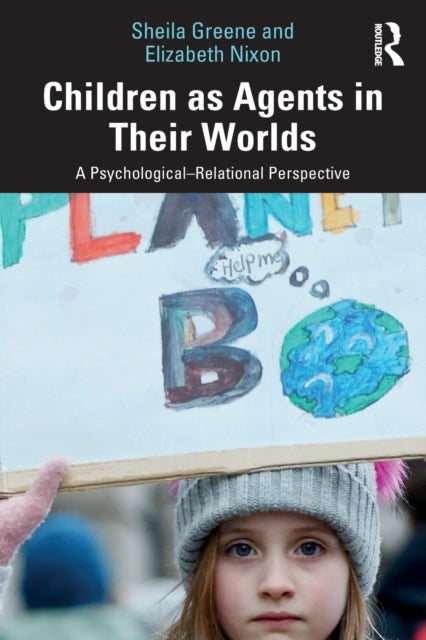SheilaGreene,ElizabethNixon
Children as Agents in Their Worlds: A Psychological-Relational Perspective
Children as Agents in Their Worlds: A Psychological-Relational Perspective
YOU SAVE £1.92
- Condition: Brand new
- UK Delivery times: Usually arrives within 2 - 3 working days
- UK Shipping: Fee starts at £2.39. Subject to product weight & dimension
Bulk ordering. Want 15 or more copies? Get a personalised quote and bigger discounts. Learn more about bulk orders.
Couldn't load pickup availability
- More about Children as Agents in Their Worlds: A Psychological-Relational Perspective
Children are active agents who can think about and influence their lives and the world around them. Their development is influenced by genes, neurons, and their interactions with their social and material worlds. Greene and Nixon's book "Children as Agents in Their Worlds" explores agency and diversity, examining sex, age, genetic inheritance, and contextual sources of difference. It provides a stronger theoretical base for research and policy in developmental psychology, sociology, anthropology, education, childhood studies, and children's rights.
Format: Paperback / softback
Length: 256 pages
Publication date: 19 March 2020
Publisher: Taylor & Francis Ltd
Children, the recipients of influence from their parents and society, are active agents in shaping their own lives and the world around them. While their genes and neurons play a role in their development, their capacity for thought and influence is remarkable. Through their interactions with their social and material worlds, children develop agency, the ability to act and make decisions on their own terms.
Are children agents? This question is at the heart of Greene and Nixon's book, Children as Agents in Their Worlds. The authors argue that children are not passive recipients of influence but active agents who can shape their own experiences and relationships. They draw on a range of perspectives, including psychology, sociology, anthropology, and education, to explore the development of agency in children.
One key theme in the book is the agency within families. Greene and Nixon discuss how children's interactions with their parents and other family members shape their sense of self and agency. They argue that children's agency is not just a product of their own actions but also of the relationships they develop with others. Children learn through observation, imitation, and socialization, and they can develop a sense of agency by taking on roles and responsibilities within their families.
Another important theme is agency within the school context. Greene and Nixon explore how children's interactions with teachers, peers, and the school environment shape their sense of agency and ability to learn. They argue that schools can either support or hinder children's agency by creating environments that are inclusive, respectful, and empowering. Children who feel valued and supported by their teachers and peers are more likely to develop a sense of agency and take ownership of their learning.
Children as Agents in Their Worlds also examines children's agency in the wider public sphere. The authors discuss how children can become agents of change through their activism, advocacy, and participation in community organizations. They argue that children have the power to influence policies and practices that affect their lives and the lives of others, and that they can develop a sense of agency by becoming involved in social and political issues.
In addition to exploring the development of agency, Greene and Nixon also examine agency and diversity. They discuss how sex, age, genetic inheritance, and contextual sources of difference, such as social class and geographical location, can shape children's experiences and opportunities. They argue that it is essential to recognize and address these differences to promote equity and inclusion for all children.
Overall, Children as Agents in Their Worlds provides a comprehensive and critical analysis of the development of agency in children. The book offers a strong theoretical base for research and policy, synthesizing both psychological and relational theories to shed light on the complex processes that shape children's lives. It will be essential reading for students and professionals in developmental psychology, sociology, anthropology, education, childhood studies, children's rights, and related fields.
In conclusion, children are not passive recipients of influence but active agents who can shape their own lives and the world around them. Through their interactions with their social and material worlds, children develop agency, the ability to act and make decisions on their own terms. Greene and Nixon's book, Children as Agents in Their Worlds, provides a valuable contribution to our understanding of the development of agency in children and offers a strong theoretical base for research and policy. By recognizing and promoting children's agency, we can create a more inclusive and equitable world for all children.
Weight: 348g
Dimension: 233 x 167 x 13 (mm)
ISBN-13: 9781138649231
This item can be found in:
UK and International shipping information
UK and International shipping information
UK Delivery and returns information:
- Delivery within 2 - 3 days when ordering in the UK.
- Shipping fee for UK customers from £2.39. Fully tracked shipping service available.
- Returns policy: Return within 30 days of receipt for full refund.
International deliveries:
Shulph Ink now ships to Australia, Belgium, Canada, France, Germany, Ireland, Italy, India, Luxembourg Saudi Arabia, Singapore, Spain, Netherlands, New Zealand, United Arab Emirates, United States of America.
- Delivery times: within 5 - 10 days for international orders.
- Shipping fee: charges vary for overseas orders. Only tracked services are available for most international orders. Some countries have untracked shipping options.
- Customs charges: If ordering to addresses outside the United Kingdom, you may or may not incur additional customs and duties fees during local delivery.


